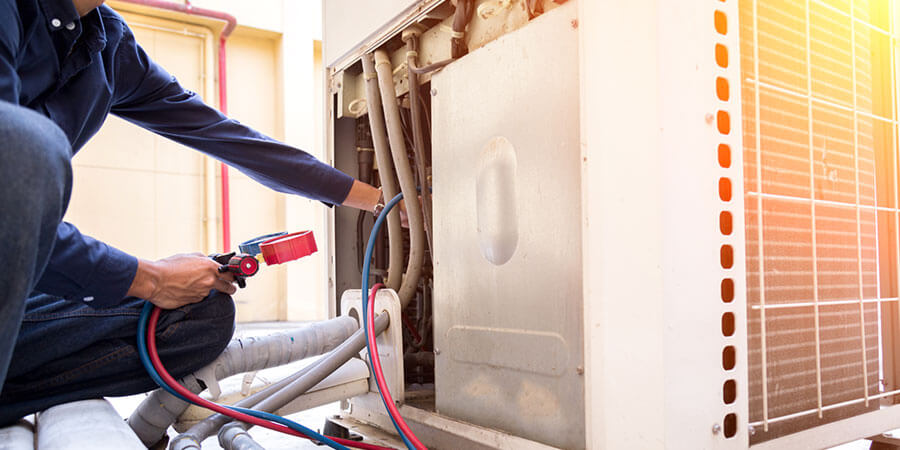Energy-Efficient A/c Equipments to Minimize Energy Expenses
As energy prices proceed to increase, the significance of energy-efficient heating and cooling systems ends up being increasingly evident. These systems not only guarantee substantial savings on utility bills however likewise add to a more sustainable future by reducing power usage. With numerous alternatives available, consisting of geothermal heatpump and ductless mini-splits, homeowner encounter a multitude of options that can improve convenience and air quality. However, understanding the vital functions and upkeep demands is vital to making best use of these advantages. What elements should be focused on when choosing the right system for your demands?
Advantages of Energy-Efficient A/c Systems
Energy-efficient a/c systems offer various benefits that extend past plain cost savings. One significant benefit is the lowered environmental effect. By eating much less energy, these systems add to lower greenhouse gas exhausts, assisting to battle climate modification and advertise sustainability. This straightens with increasing societal needs for environmentally friendly techniques in property and commercial settings.
In addition, energy-efficient cooling and heating systems commonly give enhanced comfort levels. Much of these systems include innovative modern technology that enables better temperature level control and enhanced air high quality (DMAKS HVAC). This causes a much healthier indoor setting, which is especially vital for people with allergic reactions or breathing problems
In addition, spending in energy-efficient cooling and heating systems can enhance residential or commercial property value. As more customers focus on energy effectiveness, homes and buildings geared up with these systems may attract higher bids in the genuine estate market.
Sorts Of Energy-Efficient Heating And Cooling Options
How can house owners and companies select one of the most ideal energy-efficient a/c options for their requirements? The market supplies a range of energy-efficient HVAC systems, each made to enhance convenience while minimizing power usage.
One choice is the variable refrigerant flow (VRF) system, which successfully manages the temperature in multiple zones within a structure. This system adapts its cooling agent flow to match the preferred temperature level, resulting in substantial energy savings.
Another prominent choice is geothermal warmth pumps, which utilize the planet's stable temperature level to heat and awesome areas. By moving warm to and from the ground, these systems demonstrate remarkable effectiveness, specifically in modest climates.
Furthermore, ductless mini-split systems provide an energy-efficient option for homes lacking ductwork. These systems enable zone-specific heating & cooling, decreasing power waste in vacant locations.
Last but not least, high-efficiency heating systems and air conditioners, with sophisticated SEER and AFUE rankings, use dependable environment control while eating less power than conventional versions. By evaluating these options, house owners and businesses can select a cooling and heating system tailored to their particular requirements and power performance goals.
Trick Functions to Take Into Consideration

Next, investigate the type of compressor made use of in the system. DMAKS HVAC. Variable-speed compressors can change their result to match the heating or cooling down demand, bring about enhanced convenience and power savings compared to single-speed versions. Furthermore, seek systems geared up with smart thermostats that offer programmable settings and remote accessibility, enabling far better control over energy usage
An additional crucial feature is the system's air purification capacity. High-efficiency filters can boost interior air top quality and lower energy usage by making sure the system operates effectively. Moreover, consider the type of refrigerant used; modern systems often utilize environmentally friendly refrigerants that have a lower environmental influence.
Lastly, ensure that the system works with zoning technology, which allows for tailored temperature control in hop over to here different areas of your home, improving comfort while decreasing power usage.
Tips for Choosing the Right System


Next, consider power effectiveness scores, especially the Seasonal Energy Efficiency Proportion (SEER) for cooling systems and the Annual Gas Utilization Performance (AFUE) for home heating systems. Higher rankings suggest higher efficiency, which can cause considerable savings on energy bills in time.
In addition, examine the kind of a/c system that ideal fits your lifestyle and spending plan. Choices consist of air conditioning, ductless mini-splits, and warm pumps, each with its own collection of advantages and drawbacks.
Do not forget the significance of correct installment and sizing; an improperly sized system can lead to ineffectiveness and raised wear. Seek advice from with a professional A/c professional to get expert suggestions customized to your home's distinct needs. This extensive technique will certainly guarantee that you choose an energy-efficient HVAC system that satisfies your demands and budget successfully.
Upkeep for Optimum Efficiency
As soon as the best a/c system remains in area, ongoing upkeep becomes key to making certain optimal effectiveness and long life. A well-maintained system operates better, resulting in reduced energy usage and minimized utility costs. Regular assessments and tune-ups must be scheduled at least two times a year-- as soon as prior to the cooling season and as soon as prior to the heating season.

Homeowners should additionally be vigilant about checking their heating and cooling system's efficiency. Unusual noises, rising and fall temperatures, or increased power bills can show underlying issues that require prompt focus. By attending to these concerns without delay, home owners can prevent costly repairs and extend the life-span of their systems.
Purchasing a maintenance plan with a certified technician not only enhances performance yet likewise supplies satisfaction, recognizing that check that the system is running at its ideal. DMAKS HVAC. Normal upkeep is consequently crucial for explanation sustaining power performance and decreasing general operational costs
Conclusion
In final thought, energy-efficient a/c systems provide a sensible service for lowering utility bills while improving convenience and air high quality. By integrating advanced innovations and options such as geothermal heat pumps and ductless mini-splits, residential property proprietors can achieve substantial energy financial savings and contribute to ecological sustainability. Cautious consideration of system attributes and continuous maintenance additionally ensures ideal performance, making energy-efficient systems a prudent investment for both financial and ecological benefits.